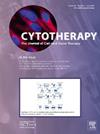Rapid manufacture of low-seed CAR-T cells in a GMP-grade hollow-fiber bioreactor platform
IF 3.7
3区 医学
Q2 BIOTECHNOLOGY & APPLIED MICROBIOLOGY
引用次数: 0
Abstract
Both quality of product and rapidity of manufacture are critical parameters if ex vivo manufacturing of autologous chimeric antigen receptor T cell (CAR-T) therapies is to reach its full potential. The Quantum Flex Cell Expansion System from Terumo Blood and Cell Technologies (Terumo BCT), a hollow-fiber bioreactor platform, is one of several cell expansion systems available to cell and gene therapy manufacturers to generate such cells in a GMP-compliant manner. In this study, the dynamic range of the Quantum Flex platform to expand CD19 CAR-T cells from variable quantities of starting material was investigated. Reflecting the industry's utilization of contract development manufacturing organizations (CDMOs) for accelerating clinical timelines, Terumo Blood and Cell Technologies performed a technology transfer of application protocols for study execution. Four different amounts of starting material (1, 3, 6 and 15 million cells) were expanded on Quantum Flex, using a unique donor's cells for each run. In this study, CAR-T cells were created using commercially obtained T cells and an anti-CD19 CAR-T lentiviral construct. The resultant heterogenous cell populations were expanded for 7 days in the functionally closed bioreactor platform. Expansion kinetics for all 4 starting material amounts were remarkedly similar, resulting in a 150- to 200-fold increase in cell numbers. This allowed for a study maximum of 2.6 billion cells from loading 15 million cells. Viability remained high throughout the expansion process with >93% for all 4 donors at harvest. To complete the manufacturing cycle, the automated and functionally closed Finia Fill and Finish System (Terumo Blood and Cell Technologies, Lakewood, CO) was used to formulate the cells for cryopreservation. Postprocedure analysis for potency and cytotoxicity demonstrated the production of efficacious cells. With this range of starting numbers, the platform is relevant to adult, pediatric and compassionate CAR-T expansion dosing. Today, several platforms are available to achieve sufficient cell yields for therapeutic applications of CAR-T, and awareness of the capabilities, pros and cons of each platform is critical to drive progress.
在 GMP 级中空纤维生物反应器平台上快速制造低种子 CAR-T 细胞。
自体嵌合抗原受体 T 细胞(CAR-T)疗法的体内外生产要想充分发挥潜力,产品质量和生产速度都是关键参数。泰尔茂血液与细胞技术公司(Terumo BCT)的Quantum Flex细胞扩增系统是一种中空纤维生物反应器平台,是细胞和基因疗法制造商可用来以符合GMP标准的方式生成此类细胞的几种细胞扩增系统之一。本研究调查了 Quantum Flex 平台从不同数量的起始材料扩增 CD19 CAR-T 细胞的动态范围。辉茂血液与细胞技术公司利用合同开发生产组织(CDMO)加快临床时间,这反映了该行业对合同开发生产组织的利用。在 Quantum Flex 上扩增了四种不同数量的起始材料(100 万、300 万、600 万和 1,500 万个细胞),每次扩增都使用一种独特的供体细胞。在这项研究中,CAR-T 细胞是利用市场上获得的 T 细胞和抗 CD19 CAR-T 慢病毒构建体创建的。由此产生的异源细胞群在功能封闭的生物反应器平台上扩增了 7 天。四种起始材料的扩增动力学非常相似,细胞数量增加了 150 到 200 倍。这样,从装载的 1,500 万个细胞中最多可获得 26 亿个细胞。在整个扩增过程中,4 个供体细胞的存活率都保持在 93% 以上。为了完成生产周期,使用了自动化和功能封闭的 Finia Fill and Finish 系统(Terumo 血液和细胞技术公司,科罗拉多州莱克伍德)来配制细胞进行冷冻保存。程序后的效力和细胞毒性分析表明生产出了有效的细胞。有了这个起始数量范围,该平台就适用于成人、儿童和同情性 CAR-T 扩增剂量。如今,有几种平台可以为 CAR-T 的治疗应用提供足够的细胞产量,而了解每种平台的能力和利弊对于推动进展至关重要。
本文章由计算机程序翻译,如有差异,请以英文原文为准。
求助全文
约1分钟内获得全文
求助全文
来源期刊

Cytotherapy
医学-生物工程与应用微生物
CiteScore
6.30
自引率
4.40%
发文量
683
审稿时长
49 days
期刊介绍:
The journal brings readers the latest developments in the fast moving field of cellular therapy in man. This includes cell therapy for cancer, immune disorders, inherited diseases, tissue repair and regenerative medicine. The journal covers the science, translational development and treatment with variety of cell types including hematopoietic stem cells, immune cells (dendritic cells, NK, cells, T cells, antigen presenting cells) mesenchymal stromal cells, adipose cells, nerve, muscle, vascular and endothelial cells, and induced pluripotential stem cells. We also welcome manuscripts on subcellular derivatives such as exosomes. A specific focus is on translational research that brings cell therapy to the clinic. Cytotherapy publishes original papers, reviews, position papers editorials, commentaries and letters to the editor. We welcome "Protocols in Cytotherapy" bringing standard operating procedure for production specific cell types for clinical use within the reach of the readership.
 求助内容:
求助内容: 应助结果提醒方式:
应助结果提醒方式:


